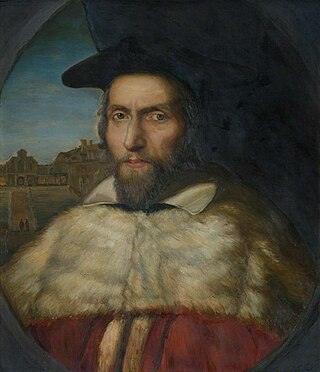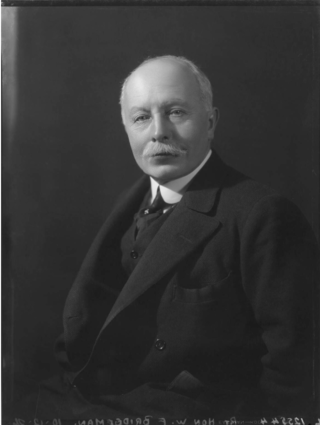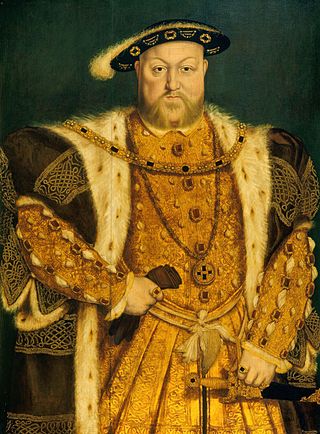Notes
- ↑ "Cambridge University tripos list", The Times, 1 July 1974, p. 5.
- ↑ "Professor Philip Williamson". University of Durham. Retrieved 4 June 2023.
Philip Williamson (born 1953) is a British historian.
Williamson grew up in Leicestershire, and attended Bosworth School and Community College (formerly Dixie Grammar School) in Desford. [1] He studied history at Peterhouse, Cambridge, under Maurice Cowling, and is considered one of the members of the Peterhouse school of history. He is now emeritus professor of modern British history at the University of Durham. [2]
Anglicanism is a Western Christian tradition which developed from the practices, liturgy, and identity of the Church of England following the English Reformation, in the context of the Protestant Reformation in Europe. It is one of the largest branches of Christianity, with around 110 million adherents worldwide as of 2001.

The Church of England is the established Christian church in England. It traces its history to the Christian church recorded as existing in the Roman province of Britain by the 3rd century and to the 6th-century Gregorian mission to Kent led by Augustine of Canterbury. Its adherents are called Anglicans.

Peterhouse is the oldest constituent college of the University of Cambridge in England, founded in 1284 by Hugh de Balsham, Bishop of Ely. Peterhouse has around 300 undergraduate and 175 graduate students, and 54 fellows. It is quite often erroneously referred to as Peterhouse College: the correct name is simply Peterhouse.

Stanley Baldwin, 1st Earl Baldwin of Bewdley, was a British statesman and Conservative politician who dominated the government of the United Kingdom between the world wars, serving as prime minister on three occasions, from May 1923 to January 1924, from November 1924 to June 1929, and from June 1935 to May 1937.

The Church of England traces its history back to 597. That year, a group of missionaries sent by the pope and led by Augustine of Canterbury began the Christianisation of the Anglo-Saxons. Augustine became the first archbishop of Canterbury. Throughout the Middle Ages, the English Church was a part of the Catholic Church led by the pope in Rome. Over the years, the church won many legal privileges and amassed vast wealth and property. This was often a point of contention between Kings of England and the church.

John Cosin was an English bishop.

The Elizabethan Religious Settlement is the name given to the religious and political arrangements made for England during the reign of Elizabeth I (1558–1603). The settlement, implemented from 1559 to 1563, marked the end of the English Reformation. It permanently shaped the Church of England's doctrine and liturgy, laying the foundation for the unique identity of Anglicanism.

Eamon Duffy is an Irish historian. He is the Emeritus Professor of the History of Christianity at the University of Cambridge, and a Fellow and former president of Magdalene College.
Maurice John Cowling was a British historian. A fellow of Peterhouse, Cambridge, for most of his career, Cowling was a leading conservative exponent of the 'high politics' approach to political history.

William Clive Bridgeman, 1st Viscount Bridgeman, PC, JP, DL was a British Conservative politician and peer. He notably served as Home Secretary between 1922 and 1924. He was also an active cricketer.
The National Day of Prayer is an annual day of observance designated by the United States Congress and held on the first Thursday of May, when people are asked "to turn to God in prayer and meditation". The president is required by law to sign a proclamation each year, encouraging all Americans to pray on this day.
A bidding-prayer is the formula of prayer, or exhortation to prayer, said during worship in churches of the Anglican Communion. It occurs during the liturgy of the word, following the sermon. Such formulae are found in the oldest of Divine Liturgy forms in the Greek church, such as the liturgy of Saint John Chrysostom, as well as in the Catholic liturgies of the early Gallican Rite, and pre-Reformation England.

The English Reformation took place in 16th-century England when the Church of England was forced by its monarchs and elites to break away from the authority of the pope and the Catholic Church. These events were part of the wider European Reformation, a religious and political movement that affected the practice of Christianity in Western and Central Europe.

The National Government of 1931–1935 was formed by Ramsay MacDonald following his reappointment as Prime Minister of the United Kingdom by King George V after the general election in October 1931.

The 1928 Book of Common Prayer, sometimes known as the Deposited Book, is a liturgical book which was proposed as a revised version of the Church of England's 1662 Book of Common Prayer. Opposing what they saw as an Anglo-Catholic revision that would align the Church of England with the Catholic Church—particularly through expanding the practice of the reserved sacrament—Protestant evangelicals and nonconformists in Parliament put up significant resistance, driving what became known as the Prayer Book Crisis.

George Elwes Corrie was an English churchman and academic, Master of Jesus College, Cambridge from 1849.

In Protestant Christianity, a day of humiliation or fasting was a publicly proclaimed day of fasting and prayer in response to an event thought to signal God's judgement. A day of thanksgiving was a day set aside for public worship in thanksgiving for events believed to signal God's mercy and favor. Such a day might be proclaimed by the civil authority or the church.
The Church of England Record Society is a text publication society for the history of the Church of England. It was established in 1991. The society has published an annual volume since 1994, the first being Kenneth Fincham's Visitation Articles and Injunctions of the Early Stuart Church. The society is a registered charity.
Jane Elizabeth Anne Dawson is a British academic and historian. Her specialism is early modern history within the British Isles and the Protestant reformation.